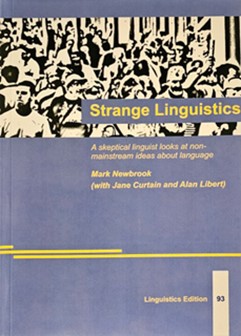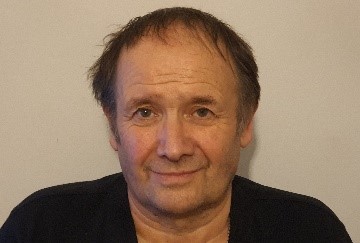ABOUT MARK NEWBROOK
Mark Newbrook was born in 1956 and grew up on the Wirral near Liverpool in North-West England. He took a BA (Hons) in Classics (including ancient and modern philosophy, and general and historical linguistics) at Corpus Christi College, Oxford, then an MA and a PhD in Linguistics at Reading University; his dissertation was in the field of quantitative dialectology and associated attitudinal matters. From 1982 to 2003 he was a lecturer and researcher in Linguistics in Singapore, Hong Kong, Perth (Western Australia) and Melbourne. Apart from sociolinguistics, dialectology and historical linguistics he has worked on English grammar and phonology and latterly (combining his linguistics with his broad-based interests in skepticism) skeptical linguistics, becoming the linguistics consultant to Australian Skeptics and now to the two main British skeptical organisations. Among his many publications he authored Strange Linguistics (2013), the first ever book-length critical survey work on fringe ideas about language. His other interests include philosophy, astronomy, history and archaeology, science generally, skeptical cryptozoology, mythology, travel (especially heritage tourism), science-fiction & fantasy literature, poetry, art, sports (he was on the founding committee of Oxford University Rugby League Football Club and has been active more widely in the game as an administrator, writer, broadcaster, spectator and occasionally as a referee or player; he is also interested in other sports, notably cricket and Australian football, and in sports history), music (especially rock, folk and folk-rock) and learning in all fields. He currently lives in the English Lake District with his partner. His email address is morcusporcus@btinternet.com.
What is Skeptical Linguistics?

The term 'skeptical linguistics' in the sense relevant here refers to skeptical scrutiny of 'fringe linguistics', i.e. non-mainstream, amateur ideas about matters of language; I seem to have invented this term in this sense. (The term was used earlier by Paul Postal, but to refer to mainstream skepticism about mainstream linguistics.) I have at times dealt also with the ideas of 'maverick' minority groups of professional linguists, and with 'folk-linguistics', that is to say the everyday thought of non-linguists about language.
I became interested in this subject through coming to realise from extensive reading in the skeptical literature that there are/have been many 'strange' ideas and beliefs about language, advanced by writers without linguistic training, which had not been discussed adequately (if at all) in a critical vein. This situation has arisen because of the very small size of the intersect between the sets of qualified linguists and active skeptics. As in other disciplines, most mainstream linguists are either unaware of fringe ideas involving language or disinclined to give them any attention; and most active skeptics know little or nothing about linguistics. As a result, few skeptics and indeed few others who read in this area have become aware of the highly dubious status of much that is said about language by fringe authors.
In some cases this lack of awareness can actually have damaging consequences. For example, some superficially plausible non-mainstream ideas about the origins of languages or influences between languages appear to involve nationalistic, racial or religious notions relating to contentious issues in history (and modern politics) and can become inputs to - or support for - racist or other prejudiced positions. This can have practical consequences in fields as important as the content of curricula for the education of major minority groups, or even for relations between entire communities espousing different religions and/or having different ethnic or national origins.
In another vein, some of the non-mainstream ideas I discuss involve language-based therapies for physical and especially for psychological disorders. These ideas too may seem attractive and plausible, but to a linguist they usually appear much less plausible. And when they have been carefully tested by linguists or other trained experimenters they have not been shown to be valid, still less effective as remedies, and thus should not be relied upon. In fact, so far from being useful, some of them might even do harm rather than good. They are also typically expensive. Ideas of this kind too can be very damaging.
In other cases, non-mainstream ideas about language are not necessarily dangerous; but I take it that in general terms it is better to be probably right than probably wrong/confused about matters of fact (or theory - although linguistic theory is a subject upon which mainstream academic views are rather diverse). It is also useful if any linguistically-oriented input to critical discussion in other domains is as well-informed and as coherent as possible. I hope that work such as mine will be found useful in furnishing reliable information of that kind and improving the standard of such discussion.
In 1990-91 I became a member of Victorian Skeptics in Melbourne, and in response to a call for papers on novel themes I offered a talk on fringe historical linguistics, exemplified especially with the non-mainstream linguistic ideas of Robert Temple (The Sirius Mystery, etc). Since then I have been active as a speaker and writer on these matters, and in 2013 I published the first ever book-length critical survey work in this area: Strange Linguistics (Lincom-Europa, Munich). (A second volume is possible.)
Copies of this book are available through me at the author's 50% discount, for £/EU 20 including postage within the UK. Anyone who would like one should suggest means of payment (Paypal is possible) and provide their postal address. My email address is morcusporcus@btinternet.com.
